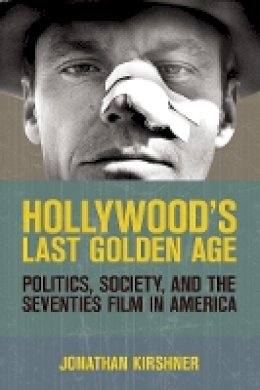
Hollywood´s Last Golden Age: Politics, Society, and the Seventies Film in America
Jonathan Kirshner
Kirshner's commentary on these and other films is stimulating...Kirshner's book provides intriguing insights for anyone interested in the relation between film and wider culture.―The Journal of American Culture
Between 1967 and 1976 a number of extraordinary factors converged to produce an uncommonly adventurous era in the history of American film. The end of censorship, the decline of the studio system, economic changes in the industry, and demographic shifts among audiences, filmmakers, and critics created an unprecedented opportunity for a new type of Hollywood movie, one that Jonathan Kirshner identifies as the "seventies film." In Hollywood's Last Golden Age, Kirshner shows the ways in which key films from this period—including Chinatown, Five Easy Pieces, The Graduate, and Nashville, as well as underappreciated films such as The Friends of Eddie Coyle, Klute, and Night Moves—were important works of art in continuous dialogue with the political, social, personal, and philosophical issues of their times.
These "seventies films" reflected the era's social and political upheavals: the civil rights movement, the domestic consequences of the Vietnam war, the sexual revolution, women's liberation, the end of the long postwar economic boom, the Shakespearean saga of the Nixon Administration and Watergate. Hollywood films, in this brief, exceptional moment, embraced a new aesthetic and a new approach to storytelling, creating self-consciously gritty, character-driven explorations of moral and narrative ambiguity. Although the rise of the blockbuster in the second half of the 1970s largely ended Hollywood’s embrace of more challenging films, Kirshner argues that seventies filmmakers showed that it was possible to combine commercial entertainment with serious explorations of politics, society, and characters’ interior lives.
Product Details
About Jonathan Kirshner
Reviews for Hollywood´s Last Golden Age: Politics, Society, and the Seventies Film in America
Ian Gilchrist
Reel Ink
Kirshner... offers insightful, well-written interpretations of some two dozen films—with briefer references to others—that date from 1967 to 1976.... For Kirshner, the primary characteristics of this golden age include a 'moral ambiguity' that portrays the world in shades of gray rather than in black and white; plots driven by imperfect protagonists rather than by frenetic action; a concern for social and political implications; visual styles that were 'often shaky, darker, filtered, or grainy'; and a desire among filmmakers to create serious, meaningful works of art. A useful appendix lists 100 top films from this period, including 20 deemed canonical.
Choice
Kirshner's commentary on these and other films is stimulating. He also provides a useful appendix of one hundred Seventies films. Kirshner's book provides intriguing insights for anyone interested in the relation between film and wider culture.
The Journal of American Culture
Kirshner's writing is lively and informative, and the book excels when he discusses long forgotten seventies films (such as, The Friends of Eddie Coyle, Mickey and Nicky, and The Yakuza), suggest new ways to view popular films (although Michael Carelone as a Nixonian character in The Godfather, Part II could have been taken further), or focuses on topics often ignored in surveys of New Hollywood (the rising skepticism many felt towards capitalism, as discussed in relation to Nashville, Network, and Shampoo).... Kirshner's book expands on many themes discussed elsewhere, but his skillful analysis and solid research, especially pertaining to the cultural politics of the era, serves as a great introduction to this rich era of filmmaking.
Julie Lobalzo Wright
The Journal of Popular Culture
Renewed interest in Hollywood film of the 1970s, evident in documentaries, popular books, and a burgeoning reissue market, has generated myth and hagiography, and Hollywood's Last Golden Age supplies an important corrective to this tendency by substantiating the contexts for key films of the period. Readers of Hollywood's Last Golden Age will likewise be awakened to the ways that the political rhythms and feeling of this time reverberated through American screens, the way that cinema both announced and brought audiences into the 1970s.
Nathan Holmes
Journal of American Studies
The author, a professor of government at Cornell, draws a clear correlation between the rather startling shift in American filmmaking (increased violence and sexual themes, more overt establishment motifs, the rise of the antihero) and political and social events of the 1950s and early '60s (such as the sexual revolution, the war in Vietnam, the assassinations of key political figures, the Communist witch hunts). Libraries with active film-history collections will want to add this one.
David Pitt
Booklist
Thoughtful, interesting and engaging.... Kirshner succeeds at a difficult task.... [A}n excellent book, well argued, clearly written, and free of the theoretical jargon that plagues so much film scholarship.
Robert T. Schultz
History: Reviews of New Books
Jonathan Kirshner, a Cornell University political scientist with a compelling interest in film, argues that this decade (1967–1976) was Hollywood's last golden age.... [S]uch classics as The Graduate (1967), Bonnie and Clyde (1967), Klute (1971), Midnight Cowboy (1969), Chinatown (1974), and Shampoo (1975) are subjected to intensive examination. These close readings are both the core and the strength of Kirshner's book (p. 2). They afford readers new ways of looking at these films, new insights into the conscious and unconscious motives of the filmmakers, and new frameworks for grasping the meanings and actions of the characters.... I found his book a joy to read and a refreshing reintroduction to the motion pictures of my youth.
Jerold Simmons
Journal of American History
The book intelligently combines social and political history of the period with an analysis of the films created during the time and, in doing so, displays the relation between the two, arguing that the cinema of the 1970s was greatly influenced by the socio-political changes that were taking place in the US.
Tatiana Prorokova (Marburg)
Amerikastudien
